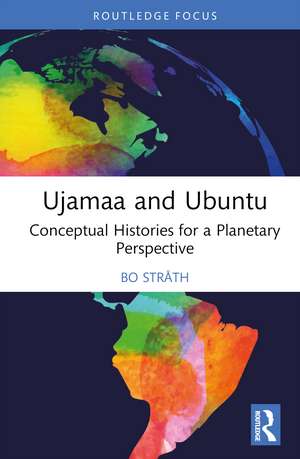Ujamaa and Ubuntu: Conceptual Histories for a Planetary Perspective: Routledge Approaches to History
Autor Bo Stråthen Limba Engleză Hardback – 15 dec 2023
Against the backdrop of this meta-normative point of departure, the book argues that a convincing grand narrative has failed to materialize since the discrediting of globalization. In the search for a new narrative, it argues at a meta-normative level for a reformulation of the term ‘global’ away from its close connection to the globe as an unbounded self-propelling market that exists beyond human influence. ‘Global’ should no longer be reduced to auto-playing market fiction but instead be connected to the planet, Terra, the Earth. With reference to Latour and Chakrabarty, ‘global’ and ‘planetary’ mean cohabitation; life on earth is seen as an infinite symbiotic system, nurtured, and protected, but also destroyed, by human action.
The book argues that a new conceptualization of ‘the global’ and ‘the planet’ requires input from African and Asian language cultures. The book explores in depth the history of the two political African key concepts of ujamaa and ubuntu and argues that they are cases showing how work on a new global/planetary narrative might look. The investigation of the two concepts demonstrate that translations are juxtapositions that point up what is shared and what isn’t between concepts in two or more languages. The point of comparison is not to develop a uniform, global perspective, even if that were possible, but to develop a global understanding of difference and, through that, to begin to look for a common ground. Translations of political key concepts are the source of a growing understanding of difference.
Din seria Routledge Approaches to History
-
 Preț: 326.99 lei
Preț: 326.99 lei -
 Preț: 311.70 lei
Preț: 311.70 lei -
 Preț: 311.28 lei
Preț: 311.28 lei -
 Preț: 311.41 lei
Preț: 311.41 lei -
 Preț: 309.75 lei
Preț: 309.75 lei -
 Preț: 310.96 lei
Preț: 310.96 lei -
 Preț: 353.96 lei
Preț: 353.96 lei - 9%
 Preț: 1003.81 lei
Preț: 1003.81 lei -
 Preț: 311.41 lei
Preț: 311.41 lei -
 Preț: 309.38 lei
Preț: 309.38 lei - 9%
 Preț: 934.90 lei
Preț: 934.90 lei -
 Preț: 388.26 lei
Preț: 388.26 lei -
 Preț: 389.38 lei
Preț: 389.38 lei -
 Preț: 390.37 lei
Preț: 390.37 lei -
 Preț: 418.13 lei
Preț: 418.13 lei -
 Preț: 436.14 lei
Preț: 436.14 lei -
 Preț: 418.56 lei
Preț: 418.56 lei -
 Preț: 396.29 lei
Preț: 396.29 lei - 18%
 Preț: 1109.18 lei
Preț: 1109.18 lei - 26%
 Preț: 764.20 lei
Preț: 764.20 lei - 18%
 Preț: 1060.56 lei
Preț: 1060.56 lei - 26%
 Preț: 848.96 lei
Preț: 848.96 lei - 17%
 Preț: 257.90 lei
Preț: 257.90 lei -
 Preț: 416.22 lei
Preț: 416.22 lei -
 Preț: 389.66 lei
Preț: 389.66 lei -
 Preț: 389.70 lei
Preț: 389.70 lei - 18%
 Preț: 1000.27 lei
Preț: 1000.27 lei - 18%
 Preț: 1000.27 lei
Preț: 1000.27 lei - 18%
 Preț: 1109.18 lei
Preț: 1109.18 lei - 26%
 Preț: 652.84 lei
Preț: 652.84 lei - 18%
 Preț: 1000.27 lei
Preț: 1000.27 lei - 18%
 Preț: 1056.28 lei
Preț: 1056.28 lei -
 Preț: 389.22 lei
Preț: 389.22 lei - 18%
 Preț: 1000.27 lei
Preț: 1000.27 lei -
 Preț: 416.22 lei
Preț: 416.22 lei - 18%
 Preț: 700.75 lei
Preț: 700.75 lei
Preț: 389.46 lei
Preț vechi: 423.32 lei
-8% Nou
Puncte Express: 584
Preț estimativ în valută:
74.52€ • 76.88$ • 62.19£
74.52€ • 76.88$ • 62.19£
Carte disponibilă
Livrare economică 06-20 martie
Livrare express 19-25 februarie pentru 27.02 lei
Preluare comenzi: 021 569.72.76
Specificații
ISBN-13: 9781032641515
ISBN-10: 1032641517
Pagini: 116
Ilustrații: 12 Halftones, black and white; 12 Illustrations, black and white
Dimensiuni: 156 x 234 x 14 mm
Greutate: 0.35 kg
Ediția:1
Editura: Taylor & Francis
Colecția Routledge
Seria Routledge Approaches to History
Locul publicării:Oxford, United Kingdom
ISBN-10: 1032641517
Pagini: 116
Ilustrații: 12 Halftones, black and white; 12 Illustrations, black and white
Dimensiuni: 156 x 234 x 14 mm
Greutate: 0.35 kg
Ediția:1
Editura: Taylor & Francis
Colecția Routledge
Seria Routledge Approaches to History
Locul publicării:Oxford, United Kingdom
Public țintă
AcademicNotă biografică
Bo Stråth is professor emeritus. He was Professor of Nordic, European and World History at the Helsinki University (2007–2014), Professor of Contemporary History at the European University Institute, Florence (1997–2007), and Professor of History at the Gothenburg University (1991–1997). He is the author of The Brandt Commission and the Multinationals. Planetary Perspectives (Routledge, 2023), Europe’s Utopias of Peace: 1815, 1919, 1951 (2015) and co-author of A Brief History of Political Economy (2016) and European Modernity: A Global Approach (2017).
Cuprins
1. Introduction 2. Ujamaa: evasive and elusive African socialism 3. The translation of the unwritten: ubuntu as religion, as law and as politics 4. Epilogue: can we learn from ujamaa and ubuntu?
Descriere
The book argues that a new conceptualization of ‘the global’ and ‘the planet’ requires input from African and Asian language cultures.
